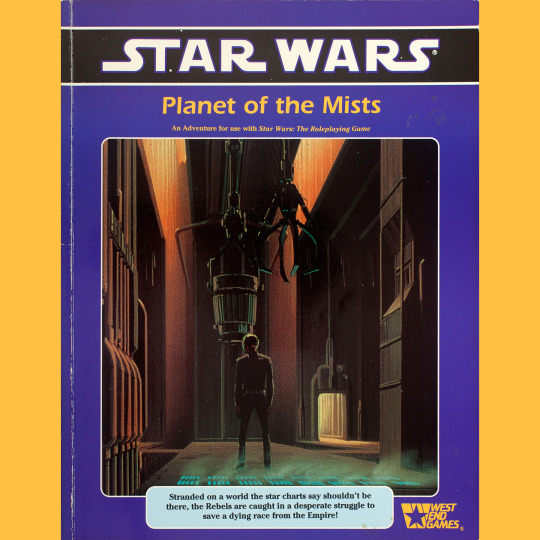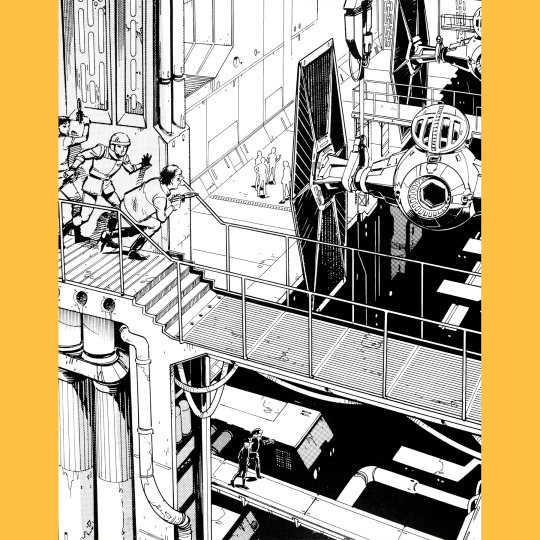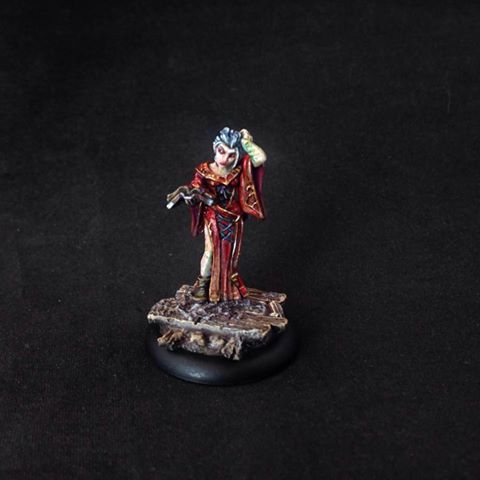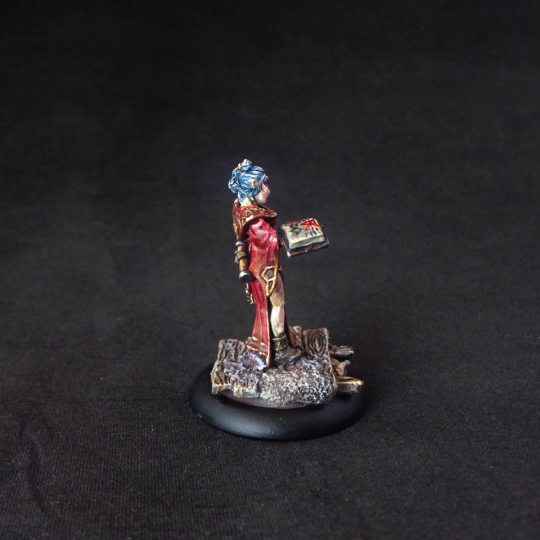#nigel findley
Explore tagged Tumblr posts
Text







Planet of the Mists (1992) is one of the second wave of Star Wars adventures, new trade dress, perfect bound. I find most of this era’s adventures to be a bit more generic — they’re better at feeling Star Wars-ish than their predecessors, but suffer a bit from the lack of weirdness of say, Otherspace, that made the early adventures so memorable.
This one is a bit of an exception to that rule, because it is penned by the always interesting Nigel Findley. It still adheres to the basic template — investigate the Imperials because the Rebels need A Thing (well, need to take a thing away from the Imps — a mineral used to power turbo lasers), crash (there are a lot of crashes in WEGSW modules) run afoul of enemy forces and eventually square off against their leader. In this case, it’s Managing Director Tyne (anticipating Director Krennic of Rogue One perhaps?) who is both a fascist bureaucrat and a dark side force user. Complicating things further is that Imperial mining operations threaten the native alien civilization, giving the proceedings a slight taste of Trek.
The adventure is surprisingly open. The first chunk is a wilderness sandbox, punctuated by pre-scripted events. This leads to the mining facility, which takes up the bulk the adventure. It’s huge and invites players to cause all sorts of chaos infiltrating it. Successfully dealing with the mine leads to a final land battle, followed by a dog fight in space. It’s all surprisingly open-ended. There is a lot of leeway in the event scripting and the NPCs are well-drawn and can be convinced to make big impacts on the proceedings. Tyne is a pretty good villain, and his henchwomen — twin mercs with conflicting loyalties — are fun. There are also no stormtroopers; instead, Tyne’s force is made up of swamp troopers. They’re Imperial Army, with different armor and cool guns that feature a grappling hook. Everyone of your players is going to want to salvage those for themselves…
Cover art is production work from Lucasfilm. I’d guess McQuarrie, but I am not entirely sure. Inside is Tim Eldred. I’ve seen his work before, maybe in Paranoia? I’m not sure. He’s good here, fits right into the vibe established by Vilardi/Nunis in the second edition era.
#dungeons & dragons#tabletop rpg#roleplaying game#rpg#d&d#ttrpg#West End Games#Star Wars#Planet of the Mists
86 notes
·
View notes
Text

"Mortals are cattle" the vampire said, without animosity. "You supply us with food, primarily, but with much more as well. You are our tools, you ephemeral, posturing fools. We use you as pawns in our ongoing plans." The creature leaned forward to fix me with its icy stare. "That is the only significance to your existence: you serve us." --From the personal journal of Dr Van Richten
(Stephen Fabian, AD&D 2e Ravenloft supplement RR3: Van Richten's Guide to Vampires by Nigel Findley, TSR, 1991.)
#D&D#Dungeons & Dragons#Stephen Fabian#vampire#Ravenloft#Van Richten's Guide to Vampires#dnd#undead#village#full moon#fantasy castle#balcony#AD&D 2e#D&D 2e#Dungeons and Dragons#TSR#1990s
141 notes
·
View notes
Text
Virtual World: No Limits (Book, Nigel D. Findley, 1996)
You can digitally borrow it here.
There's a looooong story behind this licensed sci-fi novel. The BattleTech tabletop game franchise didn't just have the MechWarrior spinoff games, but also a chain of immersive pod-based arcades since 1990 (of which only one survives today). When a second game was added to the BattleTech Centers, they rebranded to Virtual World Centers, complete with lore involving the multiverse-exploring Virtual Geographic League.
This book wasn't even the first product to delve into the lore. In 1995, the second international Virtual World Cup was televised (beginning with what Topher Florence calls The Greatest One Minute of Cable Television). It includes the entirety of the player training videos for the BattleTech and Red Planet games, introducing hotshot interdimensional pilot Samantha "Sam" Dooley, whose origin story is depicted in the novel.
For more information, there's this documentary, this Wikipedia article, this YouTube channel, mechjock.com (with past versions on the Wayback Machine, e.g. here and here) and the Waybacked virtualworld.com (e.g. here and here).

#internet archive#book#books#scifi#sci fi#science fiction#sci fi novel#scifi novel#science fiction novels#battletech#mechwarrior#virtual world#game history#video game history#gaming history#1996#1990s#90s
5 notes
·
View notes
Text
Universal Brotherhood: The bugs Bugs BuGS BUGSBUGSBUGS Adventure for Shadowrun (1st Edition). Part 1.
This was one I missed in my earlier articles on the first published adventures for 1st Edition Shadowrun, mostly because I only have vague memories of playing through it when it first came out, and not with my usual gaming group.
But there’s something else that distinguishes it from the rest – it was released as a combination sourcebook and adventure, with two separate printed books with a cardboard cover.

Where have I seen that exploding volcano before...
This is a format they would use for Native American Nations Volumes 1 & 2 the same year and Paradise Lost (detailing the now independent and non-American Kingdom of Hawai’i), though those were bound in one single book rather than two. It is sad more sourcebooks didn’t do the same. Some later releases had related adventures: Imago (set in Scotland) for London Sourcebook and Celtic Double-Cross (set in Ireland) for Tír na nÓg. But that just makes you purchase a separate sourcebook to run the adventure, which always annoyed me.
Guess it’s all about the nuyen, so ka?
With that in mind, though, there are two disappointing things about this sourcebook/adventure hybrid:
1. It’s not really a sourcebook. Rather, it is a short story along the lines of the “Matrix Born” story that occupied the second half of the 1st edition of Virtual Realities. Don’t get me wrong – both are great examples of game fiction. But this was supposed to be about the Universal Brotherhood organization, 3rd person style with occasional in-game comments that had become the norm. There’s information you could sift out to use to flesh out your own story on the UB, but even that is sparse enough you just may as well make it up yourself.
If you really wanted to set up the creepiness of the Brotherhood, then write it up like they did for Lone Star and Aztlán. Both of which needed and deserved published adventures (that’s a different post). But the set-up was fragged anyway, since…
2. They let the bug out of the cocoon too early, metaplot-wise. If you want the reveal of the Universal Brotherhood really being a front for the emergence of Insect spirits, then we need more than a year, both in and out of game, to do that. We need UB to be set up as this shiny do-gooder group that pops up from time to time in adventures and materials so that the ultimate payoff hits us like a cyberspur to the datajack.
Instead, we get a handful of mentions in Seattle Sourcebook and even London Sourcebook before the chrysalis is removed and, yup, it’s full of bugs.

Really feel bad about that baby.
Also lessening the impact is that Universal Brotherhood was released not long after Queen Euphoria, which also dealt with insect spirits. More on that later.
And I know they could have done it – look at the Renraku AI/Deus plot thread that ran from the beginning of 1st edition (rumors in Seattle Sourcebook and in more detail in the novel Never Deal With A Dragon) through Renraku Arcology Shutdown, The Network (Threats 2), Otaku (Virtual Realities 2.0, aka, the reason they ditched the Program Carrier cyberware), and finally the very destruction of the Matrix in the 3rd edition finale System Failure.
But like I said – the material itself in the sourcebook portion is excellently written by the late Nigel Findley, a powerhouse of both D&D and Shadowrun as well as, well, most other RPGs.
Onto the adventure!
9 notes
·
View notes
Text
A Shadowrun rereadalong?
#yes#2xs#i used to love this book#i haven't read it in a million years#rereadalong#the machinery of justice will not serve you here#shadowrun#nigel findley
1 note
·
View note
Note
Any of the dragons.
I think only two books will satisfy you, Anonymous. One is the 2e AD&D Draconomicon from Nigel Findley—he was (RIP) a great writer, and this book is a totally delightful overview of dragons in general, especially of the Forgotten Realms as it stood in 1990. DriveThruRPG has the PDF for ten bucks, but deep in my heart of hearts I want to you to find a physical copy for your bookshelf.
The serious dragon fan wants the 3.5 Draconomicon, which is so big you could kill a man with it, and has tons of new dragon types, plus statted-up dragons for all 10 core dragon races at every age level. Physical copies are priced through the roof, though, so stick with the PDF from DriveThruRPG unless you’re crazy about physical books like me.
Something free for tonight though? Dragon #146. Dragons, drakes, and everything in between, right as 1e AD&D was becoming 2e. Check it out!
17 notes
·
View notes
Photo

The most one-of-a-kind piece of Shadowrun I have.
33 notes
·
View notes
Text
Manara, the Lich of a Thousand Violent Deaths



So I’ve been quiet, I know, but I’ve got an excuse: Not really. I’ve got things to do, I’ll post more about Neogi SoonTM, but I’m super excited about this miniature. A Reaper miniature that was custom painted by the talented Four Realms of Chaos team (https://www.instagram.com/fourrealmsofchaos/?hl=en ) this is not just a lich, this is Manara from Nigel Findley’s “Skull & Crossbows”.
Out of all the roving pirate ships in that Spelljammer sourcebook, her ship “Nex” and the entire idea behind Manara is just fantastic. A former curious adventurer who went into a crystal sphere that was populated by partying demigods that have super strong implications that these demigods were ah, performing some “celebrating good times” (they were bangin’).
Manara is like, “Okay that’s happening, just gonna keep exploring,” and wanted to go on her merry way.
The demigods went, “You need to get out and also never talk about this cause Velsharoon is rubbing oil all over his bald skull and-”
And Manara laughs it off, thinking they’re just being ridiculous and keeps exploring. And then the demigods decide screw it, punish her with eternal life. Totally a Ancient Greek tragedy idea of hubris then and there, a relatively innocent gesture that causes a huge consequence because gods are drama queens/kings.
So how does Manara die initially? The gods send a fleet of giffs to kill her, kill her crew, destroy her ship, resurrect her crew as zombies, reform her ship and bring her back as a lich with a bigger hitch than usual: She comes back regardless of her phylactery. Manara cannot die unless she dies in a fight where she tries her best, and the demigods as a majority decide that yeah she did her best in the fight- but this is super subjective. So arguments between these petty, bickering demigods who want their party crystal sphere hidden (all mentions of it and its locations have been erased by the demigods), and they channel their divine will into Manara to maintain a pseudo immortality that she doesn’t want. And Manara goes slowly crazy, from sparing people who she bested in fights to just slaughtering everyone because she can’t take her terrible existence and is jealous of the living, and any and all who die by her, by her ship or by her zombies, are taken by the gods and forced to become a part of her crew.
So over the centuries some of the demigods actually start to feel guilty (I’m guessing the nicer demigods, they are never actually named but you can pull a page from any prime material plane’s lore), and they plot to figure out how to make it seem like Manara tried her best so they can vote for her to finally rest. Unfortunately, Manara’s got centuries of constant combat under her belt, and she alone is a hard fight, never mind her crew of 50+ zombies, ranging from soldiers to umber hulk zombies who all have their abilities that they had in life. Seriously, taking her on head on with a party is pretty much a death sentence for any party, you need a small army.
I think what I really like the most is even if you kill Manara, break her “phylactery” ,which is a cheap glass gem necklace, and you stand triumphant- I just have this visualization where you stand in front of a tribune of demigods and you gotta argue why she deserves to stay dead. Nigel Findley did not have such an idea, and has a more straightforward solution, but hey I like Phoenix Wright what can I say?
Anyhoo, that’s Manara- she’s a 14th lvl wizard/lich, and in AD&D that meant real business compared to 5th E DnD. Not an insult to 5e, but AD&D’s spells definitely had a bit more...holy shit in its effects. One of her spells is the 6th level Death Spell, there is no saving throw, 1 round/standard action cast time, and when she casts it she rolls 4d20 (d20′s!!!!), and she will automatically kill that amount of creatures/players/monsters in HD. It’s a nuclear version of the sleep spell. Just imagine, automatically killing 4-80 HD worth of people without a saving throw. Granted it has a stipulation that beyond 6HD+, the spell takes an additional 10 points from the 4d20 dice to kill that creature but also you have to calculate some values for HDs between 3-5. I don’t blame 5e for removing this spell because seriously, no save throw, 4d20′s, fucking party wipe as a getgo with weird stipulations. And you know with the premise that she has to showcase she’s trying her hardest so she can die? You can bet her theme song is Megalovania, start off with her best spell to wipe you out.
But she has 7th level spells, right? So what does she have? Finger of Death. With all honesty, I really think that the spell levels should be reversed, as FoD has a save throw even in AD&D, but can theoretically kill anything of any HD, while the Death Spell is just an AoE insta-death zone that could kill a lot, or kill nothing. MR could still of course negate it all, but seriously, the concept of Manara and Greek tragedy and her pursuit of wanting to find a “good death” just creates a wonderful lich antagonist that isn’t necessarily cackling evil for the sake of cackling evil. Leave that to the Neogi.
5 notes
·
View notes
Text






Friends, if there is one Role Aids product you should have on your shelf, it is this box set, Realms of Fantasy: To Hell and Back (1993). I have had it on my shelf for a while and kind of paid it no mind, partly because of use of a colored Doré engraving from Inferno just makes the thing seem so generic. Especially as it came out in the shadow of the very Vertigo-esque Role Aids sub-line, Demons, which was a far glitzier series of box sets. But this is the one. Pure gold. Probably my very favorite Role Aids product.
Inside are two primary books, by the late, lamented Nigel Findley. The first essentially translates Dante’s Inferno into game terms, from the first circle to the ninth. The second half of that book presents Dis, the city of hot iron, in fairly vivid detail. Grade-A stuff, distinct in character from and very much anticipating Planescape, which was still a year off.
The second book is perhaps even more interesting, because I simply didn’t expect it. Here we have profiles of other realms: Atlantis, Avalon, Faerie and, most intriguing, Selene, the city of vampires. The first trio adhere, essentially, to what you expect, with just a little bit of spice added by Findley. The fourth though, was a complete surprise, based on a vampire novel by Frenchman Paul Féval, one of three he penned decades before Stoker’s Dracula. I have never heard of this before and it is so exciting: in the original novel, the city is made of black jasper and situated near Belgrade, but normally invisible to mortal eyes until Ann Radcliffe (yes, the author of The Mysteries of Udolpho) and a band of unlikely allies lay siege to it in order to rescue a kidnapped friend. I need to read this ASAP.
There is also a pile of maps and a sheaf of monster sheets, full of interesting critters. The art throughout is excellent: the historical images, credited to P. Domain and Clip “The Clipper” Art, mix well with new work by Julian Jackson and Joe Develasco. Get this. You won’t be disappointed.
104 notes
·
View notes
Photo

Will-o-wisps silently surround the party (Roger Raupp, “The Ecology of the Will-o-Wisp” by Nigel D Findley, Dragon 99, July 1985)
#D&D#Dungeons & Dragons#Roger Raupp#will o wisp#will o the wisp#will o wisps#will o' the wisp#will-o-the-wisp#will o' wisp#will-o-wisp#will-o-wisps#will-o'-the-wisp#Dragon magazine#swamp#fantasy forest#dnd#Dungeons and Dragons#The Ecology of#TSR
91 notes
·
View notes
Text
Why in Waterdeep there is a painter named Glorindel... Glorfindel?
Why in Waterdeep there is a painter named Glorindel… Glorfindel?
@TheEdVerse I see two references to characters in Waterdeep one a painter (Bard?) named Glorindel and another name Glorfindel are thes the same character and which is the correct name? — Dark Elf Designs (@DarkElfDesigns) September 27, 2021 1) In an article in DRAGON 179, Nigel Findley introduced the wizard-bard Glorindel of Waterdeep, maker of magical paintings. I’ve no idea how he came up with…

View On WordPress
0 notes
Text
One Stage Before, the Worst Adventure (so far) for Shadowrun (1st/2nd Edition)
That’s right, it’s the worst. And I’ll prove it.

Ya best check ya tone, chummer.
Introduction
This is the second of two adventures published by FASA for Shadowrun in 1992 (with Imago being the first), and another of the transition adventures labelled for use with 1st and 2nd Edition. One Stage Before (SKU 7312) was written by early Shadowrun stalwart Nigel Findley (aka Findler-Man from in-world Shadowland commentary) as his entry in the “Let’s Make Rockers Relevant” adventure writing competition, going up against:
Mercurial (7302; Paul Hume)
Total Eclipse (7308; William Tracy)
Dark Angel (7313; Thomas Kane), published immediately after One Stage Before, and trust me, I will have things to say about it.
Later, I shall have to do a write-up about how these instead demonstrate that Rockers and their ilk work better as NPCs than PCs, but let’s get into…

Dodge!
The Adventure
The runners are hired by a Jonathan Teague to provide investigation/protection for Lew Allenby, a grumpy dwarven music producer who has had attempts made against his life.
Wait, a grumpy dwarf? This is the least unoriginal aspect of this adventure.

Ya best check ya tone, chummer.
First strike against One Stage Before is that it’s extremely derivative; cobbled together from previous adventures. We have…
A double-crossing Mr. Johnson (as seen in Total Eclipse)
Hiring the runners to poach a client (as seen in Total Eclipse & Mercurial)
A grumpy detective-type NPC (as seen in Bottled Demon & Elven Fire)
Gang violence (as seen in Elven Fire)
A vampire (as seen in Total Eclipse)
Crashing a fancy party (as seen in Dreamchipper & Harlequin/Loves)
The Blue Flame Tavern (as seen in Peacekeeper & Eye of the Eagle, both penned by Findley)
A meet at an underground club under the Space Needle (as seen in Silver Angel)
A culminating violent finale at the residence of the BBEG where the runners will be forced to shoot a dog (as seen in Elven Fire)
But apart from all this…
Strike two: Why is this a job for shadowrunners?
“My principals want you to investigate the attempts on Allenby’s life, to find the responsible party, and then turn them over to us for, um, processing.”
There is nothing illegal about hiring a private investigator to find out who is threatening Allenby – especially when you have two chromed samurai in a Rolls Royce (500K limo) escorting the team around.

Nope, nothing phallic about the Phaeton.
Only that last part (detention and processing) is suspicious – more suspicious is Teague using his real name and company affiliation. A couple of Legwork rolls reveal that his company (Highstar Incorporated) is a Mitsuhama subsidiary and has no relationship with Allenby’s company (Caravan Productions).
A smart group of characters would immediately reject this offer and slap their fixer in the face for suggesting it in the first place. The players, however, see that the GM spent their own money on this adventure, and you know how hard it is to schedule sessions so, okay, let’s just buckle up and ride this plot train until the end. It’ll be worth it, right?
Once Allenby ends up geeked and everyone and their cousin (Lone Star, some thrill gangers, some snipers) try to kill the runners, it’s a non-forking branch of an adventure that ends up with them invading Teague’s compound and, well, killing him.

And his little dogs too.
Third strike: Worst. Payout. Ever.
There is a decent karma reward (11; greater than some of the first adventures), but no money except the initial 15,000 ¥ (split between the team) Teague paid them means that this is the lowest, so far, reward for any adventure.

The receipts.
This could have been forgiven if One Stage Before had an interesting, new, and compelling story to go along with it – like it’s predecessor Imago – but as things stand, the players and character will just have to put this behind them and look forward to the next published adventure.

Oh drek.
10 notes
·
View notes
Text
0 notes
Note
Faerie dragons
Hey Anon! You too should check out the 2e AD&D Draconomicon by Nigel Findley I mentioned earlier—he spends some time discussing the pranks of several of the good dragons, including faerie dragons, and there’s even a mini-adventure that shows what happens when adventurers stumble onto a gathering of these trickster dragons.
(I feel like faerie dragons also showed up in Dungeon Magazine a lot...anyone out there have any issue numbers to suggest?)
Then maybe try Tall Tales of the Wee Folk on DriveThru. It has woodrakes instead of faerie dragons, but there’s so much good faerie content and folklore you could adapt to faerie dragons you won’t care. And the $5 PDF price is a steal.
For something you can read immediately, though, once again I’ll reference my favorite issue of Dragon of all time: Dragon #155, which has adventure seeds for every 1e AD&D fey race, including faerie dragons.
14 notes
·
View notes
Text
Thoughts on Life and Death
When I was 25, my first close friend died. I was newly married, didn't yet know I was pregnant (but would soon find out) and living without status beyond a visitor's visa in Canada, thousands of miles from any friends of family.
I had moved to the city some months before and, knowing no one, I reached out to my "extended family" of gamers. The person I connected with was Nigel Findley, another game industry freelancer who had made his bones and was considered quite the name to us in the business at the time. He adorably agreed to meet me for coffee ("I'll wear my Shadow Run jacket so we don't need to resort to any 'I'll be the one with the rose between my teeth nonsense'.") and through him I was introduced to his extended family of gamers and the writers' group that met near his home.
Aside from his girlfriend, I was the last person to see Nigel before he died. We'd been out, two couples, and they'd dropped us off with promises to get together for more such nights soon. Nigel suffered a massive heart attack the next morning while brushing his goddamn teeth. He was 35.
I'd never suffered such a loss before. I shamelessly called his house repeatedly, just to listen to his voice on the answering machine, after I got the news.
Shortly after his death, I learned about a Wraith story he'd written not long before. White Wolf, a company I contributed to founding, was riding high as tabletop industry big shots, and they'd started a fiction line with Stewart Wieck as editor. Nigel's Wraith story appeared in the collection Death & Damnation.
For those of us who saw the story only after his death, it was a little spooky. It was clearly the most personal story he'd written, littered with a few more biographical elements than normal. The fact that it was a first-person account of a man who had recently died made it all the more unsettling. Reading the words of your recently, unexpectedly, deceased friend is even more unsettling when the text reads: "It's not fair. It's just not fucking fair. I'm 35 -- thirty-fucking-five years old. Young. Too young for this shit. My father pushed himself as hard as I push myself -- harder maybe. He didn't have to slow down until he had his first heart attack at 55. If the world was fair, I'd have another 20 years of hard charging before I had to back off the throttle."
I have a number of reasons for pondering this tonight. Last year was both amazing and a shit show, a true emotional roller coaster spiked with moments of glory and achievement but peppered with irreversible loss, grief, and sorrow. So far this year looks like it may be following the same path.
Love freely and with abandon, my dears. Support what you believe in the most, strive to create something...anything...that will outlive you, be there for each other and try, try, try. There's not much else that matters.
9 notes
·
View notes
Text
‘Just do what’s right’: Metro teen caught in act of kindness is no stranger to good deeds
KANSAS CITY, Mo. — A simple message shown through action put a humble metro teen in the spotlight.
It began as an Independence police officer’s search for the kind-hearted teen, then the promised dinner date! Although he’s not used to getting all this attention, there’s nothing new about Tyrea Pryor lending a hand.
“I’ve been doing that since I was young, just like helping people,” Pryor said.
He’s made helping people a habit. The 14-year-old volunteers every week at local schools talking with 4th- and 5th-graders about following their dreams.
“Class,” Pryor said to a group of kids, “is there any way he can pursue being a police officer?”
It was an officer who snapped the viral picture of Pryor — caught in the act of kindness.
“It looked like she needed help,” Pryor said.
A woman was struggling to get to her car in the pouring rain. So Pryor ran across the Hy-Vee parking lot, took off his own jacket and shielded the 93-year-old from the rain all the way to her car.
“I was raised to like do right toward anybody,” Pryor said. “It doesn’t matter what race or anything.”
“It just filled my heart. I was just happy,” Pryor’s mom Ebony Findley said.
Findley said it’s a common occurrence.
“Sometimes you can’t find him like, ‘What were you doing?’ ‘Oh, I went and helped so and so cut the grass,’ or ‘I went over here and did this.’ You know? He’s always offering to help someone with their groceries,” Findley said.
During Pryor’s lesson with those elementary students, they showed FOX4’s original story of the officer trying to find the teen.
“He didn’t do that act of kindness because he wanted attention or anything like that,” Pryor’s uncle Nigel Johnson said.
But taking care of that woman and her groceries scored him a free meal. Officer Joe Holt made good on his promise and took Pryor and his mom out to dinner at Red Lobster.
“He said, ‘Buy anything you want.’ I’m like, for real?” Pryor said, “He said, ‘Yeah’.”
Findley said they’ve built a special bond and will continue to stay in touch.
“What he felt that day and the compassion he had was wholeheartedly,” Findley said. “So I appreciate him.”
She appreciates Pryor, too. Findley said she loves how he soaks up life lessons like a sponge and encourages others to do the same.
Pryor’s mom posted a picture to Facebook saying the manager at the Hy-Vee where he helped the woman even gave him a job.
“It doesn’t matter who it is, just do what you know is correct,” Pryor said.
from FOX 4 Kansas City WDAF-TV | News, Weather, Sports https://fox4kc.com/2019/09/05/just-do-whats-right-metro-teen-caught-in-act-of-kindness-shares-message-for-others/
from Kansas City Happenings https://kansascityhappenings.wordpress.com/2019/09/06/just-do-whats-right-metro-teen-caught-in-act-of-kindness-is-no-stranger-to-good-deeds/
0 notes